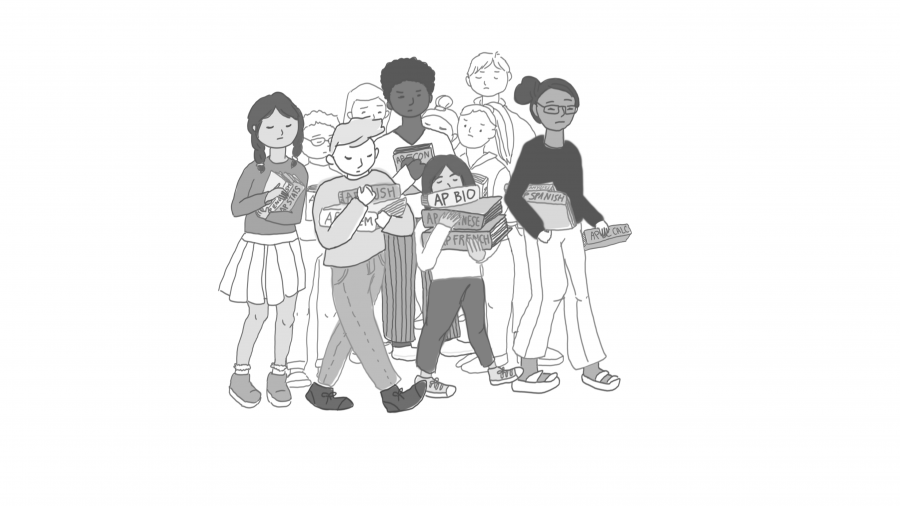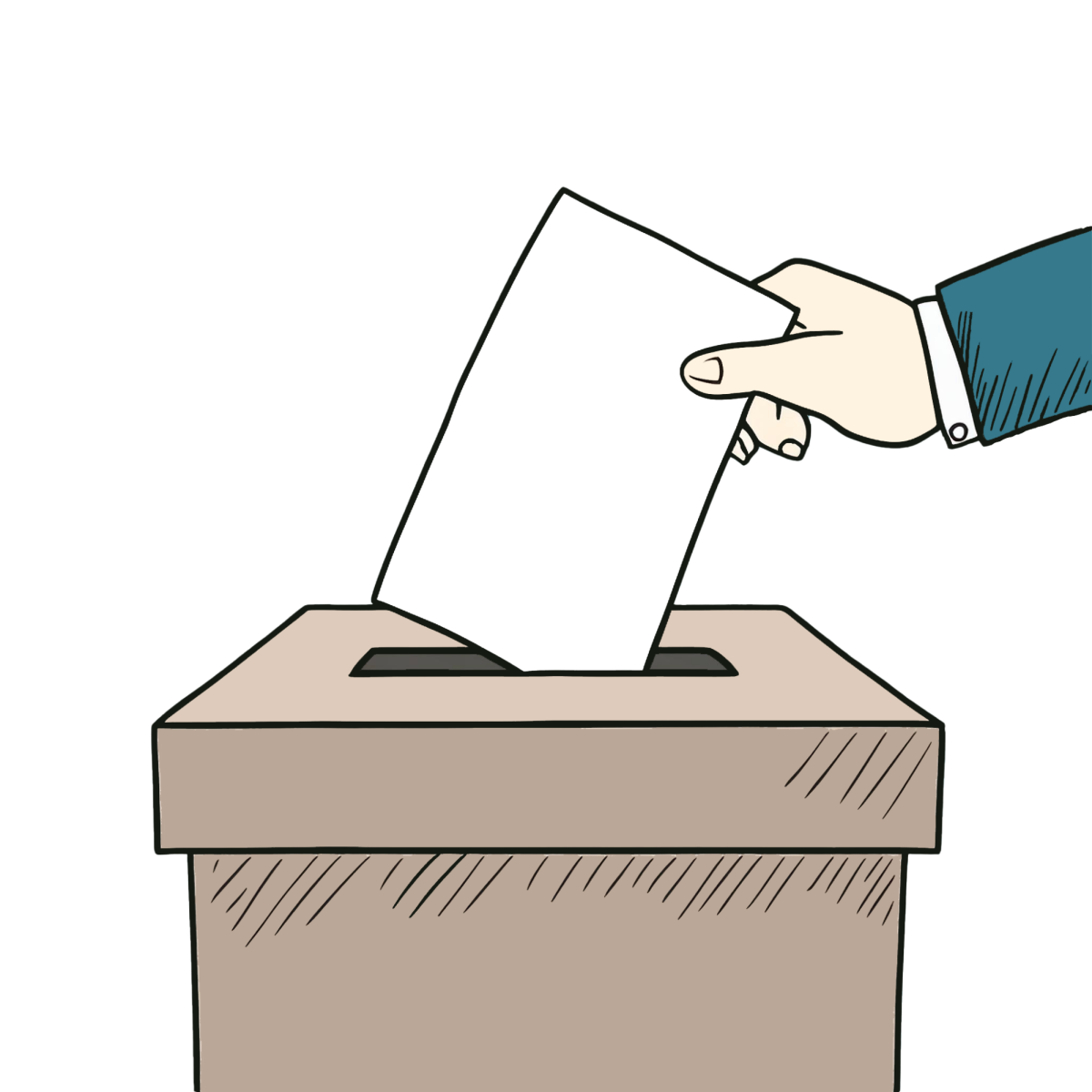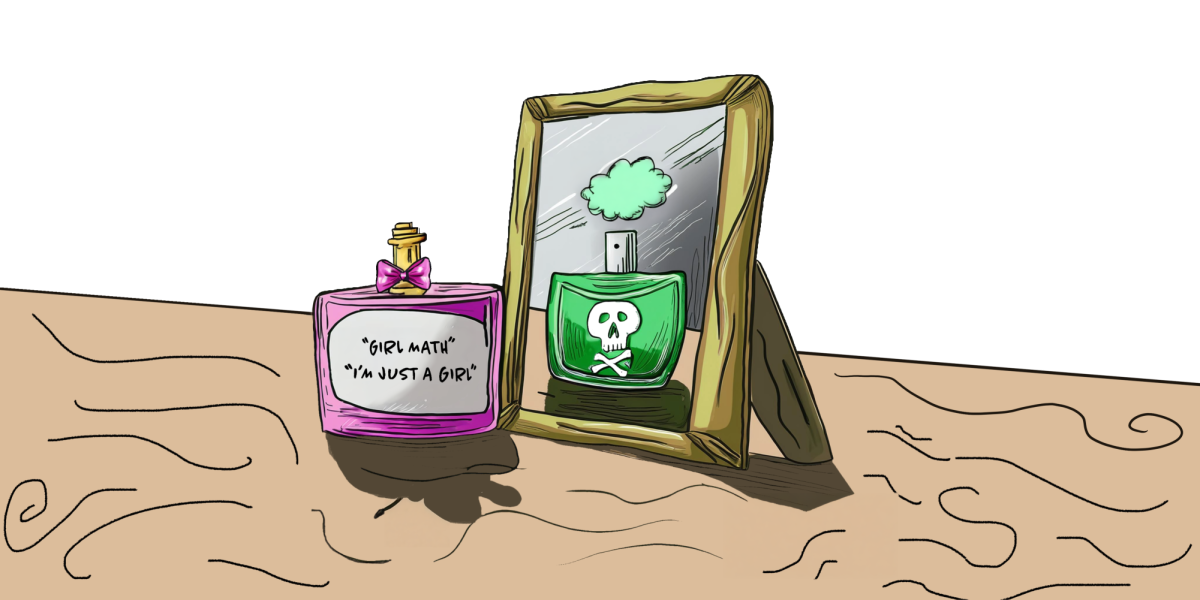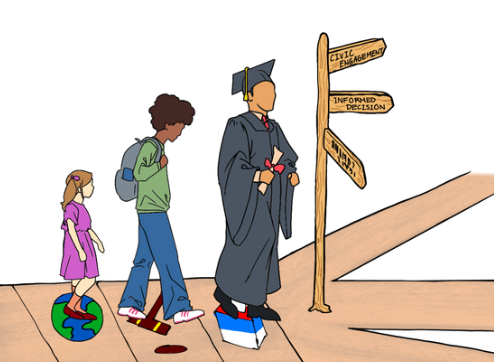Social media platforms nowadays have expanded to be used not only for personal enjoyment, but for educational purposes and connecting with classmates as well. Last year during the course selection period, a Facebook group titled “Gunn Course Selection Q&A” was created by students in order to inform their peers of the different classes offered at Gunn. It started out as a well-intentioned, informative group that students could post in if they had questions, such as which English elective to take or which art class was the most enjoyable. Now, a year later, while the group is still sometimes used to answer these questions, the focus has shifted to allow toxic comments to consume students’ lives during an already stressful time. This group has ultimately strayed from its original purpose and is now the cause of more stress and increased competition due to false information, a skewed view of classes and a focus on showing off difficult course loads.
The Facebook group has unfortunately become less populated with genuine questions about classes and more about “flexing,” or showing off difficult course schedules and high grades or test scores. Posts asking if taking five or six Advanced Placement (AP) classes is reasonable, or students posting their grades from other classes to get an opinion on whether it will be easy for them to get an “A” in the following higher course are far too common. Rather than being helpful, posts like these create stress. Just as disturbing as the question itself is the common answer— that another student took a similar course load and it was completely “manageable.” Not only does this response encourage people to take many more than the recommended number of AP or Honors classes, but it also lets the person responding subtly brag about their own difficult schedules, making others feel worse about having doubts when signing up for such rigorous courses.
In addition, these course loads may be manageable for one Gunn student but not another, depending on how much time one is spending after school on extracurriculars or after-school jobs. During the course selection process, it is common for students to be worried about their next year of high school, and the comments in the Facebook group only cause more stress. Seeing their peers brag about signing up for more than four higher- level classes makes students doubt their own choices and feel as though they cannot get into a good college or succeed in life if they do not take five or six APs each year.
In addition to boasting, it is not uncommon for people to ask about skipping lower level or even introductory courses in order to take a more advanced one immediately, especially in math. The educational system is built for students to take introductory classes early on to discover their passions or interests, not to ignore course requirements and take as many advanced, Honors or AP classes as possible. Skipping lanes also allows for larger gaps to grow between students of different economic classes, as students from wealthier families inherently have a greater opportunity to pay for a tutor or summer program in order to get ahead. Furthermore, enrolling in courses in school is much more valuable than cram- ming a year’s worth of information during the summer. In general, students will gain much more from the class by taking it with a qualified teacher at a slightly slower pace. Not only is it more valuable not to skip, but the notion of “getting ahead” creates an extremely competitive environment. Students feel inadequate when they see everyone attempting to skip and wonder if they should follow the example of their peers, even if it is not the right decision for them to make.
Another issue is that the Facebook group gives skewed views of classes and blatantly false information. Some of the genuine questions asked by rising upperclassmen have been answered by underclassmen. For those looking to take a more advanced schedule, hearing from someone who actually took the same classes they are considering is much more beneficial, especially considering most freshmen and sophomores simply don’t have the experience in these upper-level classes. Many of the questions asked about AP or Honors courses are responded to with students saying they found the classes to be easy, and rarely does anyone speak to the true effort and diffculty that accompanies such a high-level course. When such questions are answered by those who have not taken the class, they tend to be based on common rumors and misconceptions about that class rather than experience, further contributing to the skewed view of these classes.
AP and Honors courses are by no means intended to be effortless, and this point needs to be publicized more on the group than it is. The courses bearing an AP or Honors title are all college level curricula, and for those who do not excel in or enjoy the particular subject, the class will be all the more difficult. A subject coming naturally to one student is no indicator of how easy or difficult the course may be, as different students are strong in different areas. The original intent of the Facebook group is not inherently bad. It does help students get a sense of how much work must be put into courses or how enjoyable the class will be. However, when the majority of posts are screenshots of schedules with five or six AP classes, students think that this is the norm at Gunn, and are more likely to load on more higher level classes than they actually want to take.
Besides offering a skewed view of the difficulty of classes, students seem unwilling to admit that they struggled in a class. At some point, rising sophomores, juniors and seniors need to be informed of the stressful aspects of the class so that they can truly consider the pros and cons of taking the most advanced classes. The culture of the group, however, discourages people who struggled or had a bad experience in a certain class from admitting it.
As a result, the boasting of difficult course schedules, skipping ahead of peers and offering a skewed view of classes increases the competition and stress levels for students at Gunn. As is the standard for most college discussions at school, if the majority of students are applying to top 25 schools and see each other taking numerous AP courses, then they are bound to sign up for them as well. According to the California Healthy Kids survey, 28 percent of juniors felt chronic sadness or hopelessness in the past 12 months. Signing up for rigorous courses simply because that’s what peers are doing negatively impacts students, because the chosen load could be one that is detrimental to wellbeing and mental health. It also negatively influences the overall culture at Gunn because kids may be working them- selves to a state of exhaustion and depression.
This inherently toxic culture that has been manifested through the Facebook Course Selection Q&A group must be stopped now, before it becomes the legacy that this year’s students have left behind. As members of the Oracle, we are aware that some parts of our staff are contributing to the problem as well. The way information is spread about
classes or course schedules needs to be changed. The admins of the Facebook group have changed the rules to require approval before posting and announced they would be deleting any comments they deem “toxic,” but this is only a temporary solution. Students need to begin thinking about their own course loads in terms of how much work it will be and compare it with the amount of work they’re able to handle, not with how much another Gunn student can handle. In addition, we all must be mindful that not all Gunn students have the same goals. Even though a “normal” Gunn student may take numerous AP and Honors each year, there are plenty of students who take regular classes because their extracurriculars demand more from them, or simply because they’re looking for a more balanced and enjoyable high school experience. If students feel that they desperately need to discuss their specific schedule with a peer, it would be wiser to talk it through with someone they trust outside of the Facebook group.
The culture of Gunn as a whole will benefit from this change in mindset. If upperclassmen can prevent underclassmen from continuing this kind of toxic tradition, they can help shape the environment for all future classes. Hopefully, they will not have to endure the same levels of competition and stress during the course selection period as this years’ students did.




















